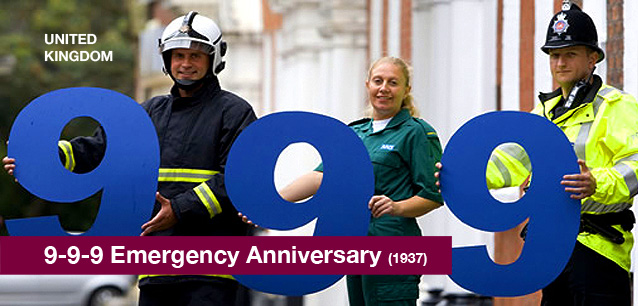 AD
AD
Today is: August 24
Scroll to explore events active on this date.
Additional Events on LEEP
LEEP INK FEATURES

August? Absolutely!
In August, we live through the Dog Days of Summer. It's hot and often humid, and those who can leave for better climates do. Down south, winter is in full force. August is also known as "the ...

In The Heat of July: July 2025 Events
Is it hot enough (or cold enough if you're below the equator) for you yet? There is actually a day for that! Like every month, I pick a diverse collection of events you may or may not know about. This ...

May Blooms: Events in May 2025
Along with October, May is one of the most densely packed months of the year. It's before the summer humidity and the last whole month of the school year. The weather is warming in t...
About 9-9-9 Emergency Number Establishment Day
Health , United Kingdom & Ireland
Ends: Jul 01, 2025
DESCRIPTION:
July 1, 1937, saw the world's first emergency telephone number deployed in London, covering a 12-mile radius from Oxford Circus. It would be another 31 years before the US would implement a similar system, 911, and even longer for other nations.
The idea of 999 was first suggested in 1935 after five women died during a fire in Wimpole Street in London. Callers using 0 to dial the police could not get through as the switchboard was jammed. By the time people got through, it was too late. The first 999 calls came in on July 2, and the system fielded 1336 calls in its first week.
TRAVEL TIP: If traveling internationally, always ask for that country's emergency number(s) when you go through customs and add them to your phone, or write it on a PostIt note and keep it in your passport. For example, in China, Japan, New Zealand, and Saudi Arabia, it is 110, but in neighboring United Arab Emirates and Bahrain, it is 999. In Argentina, Canada, Jordan, Mexico, Palau, Panama, the Philippines, the United States, and Uruguay, it is 911. Travel to Australia and you'll need 000. Some countries get complicated. Take France, for example. In France, dial 17 for the police, 15 for an ambulance, and 18 for the fire department. It can get really confusing, and in the event of an emergency, you don't want to call the wrong number accidentally and waste precious seconds. You'll also want to keep your nation's embassy contact information for each country you visit. Should you get in trouble, your country's diplomatic services will be your second call after emergency services.
VIDEOS
SUPPORTING DOCUMENTS
Currently, this event does not have supporting documents.
ADDITIONAL IMAGES
Currently, this event does not have supporting images.
Where would you like to go now?
 AD
AD


/footer-logo.svg)
